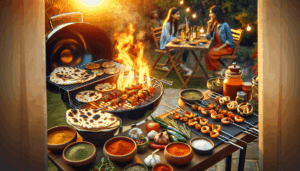Mediterranean BBQ: Precision and Tradition
Mediterranean barbecue culture is a rich tapestry of flavors and techniques that have evolved over centuries. Unlike the low-and-slow approach of American BBQ, Mediterranean grilling often emphasizes quick cooking over high heat, showcasing the natural flavors of fresh ingredients [Source: EatingWell]. This style of cooking demands precision to achieve the perfect balance of taste and texture in dishes.
The importance of precision in cooking Mediterranean dishes cannot be overstated. Whether you’re grilling souvlaki, preparing kebabs, or roasting a whole fish, timing and temperature control are crucial. Overcooking can lead to dry, tough meat, while undercooking may compromise both flavor and food safety. This is where the meat thermometer becomes an indispensable tool for the Mediterranean BBQ enthusiast.
A meat thermometer is not just a gadget; it’s a game-changer for achieving consistently excellent results. By accurately measuring the internal temperature of your meats, you can ensure that your lamb chops are perfectly medium-rare or that your chicken kebabs are fully cooked without becoming dry. This precision allows you to replicate the authentic flavors and textures of Mediterranean cuisine, elevating your backyard BBQ to new heights [Source: Tasting Table].
Moreover, using a meat thermometer aligns with the Mediterranean approach to cooking, which values quality ingredients and careful preparation. Just as ancient Phoenicians spread their culinary influence across the Mediterranean [Source: Nature], modern BBQ enthusiasts can carry on this tradition of precision and care in their own outdoor kitchens. By mastering the use of a meat thermometer, you’re not just cooking; you’re participating in a culinary legacy that spans millennia.
Mediterranean Barbecue: A Flavorful Journey
Mediterranean barbecue is a celebration of rich flavors, tender meats, and time-honored cooking techniques. BBQ enthusiasts will find a world of culinary delights in the diverse grilling traditions of countries bordering the Mediterranean Sea.
Popular Meats and Seafood:
- Lamb: The star of many Mediterranean grills, lamb is prized for its rich flavor and tender texture. Leg of lamb, lamb chops, and kofta (spiced ground lamb kebabs) are common choices.
- Seafood: With abundant coastlines, Mediterranean barbecue often features a variety of fish and shellfish. Grilled octopus, whole fish like sea bream or red mullet, and shrimp skewers are popular options.
- Chicken: Souvlaki, a Greek specialty of marinated chicken chunks on skewers, is a staple of Mediterranean grilling.
- Pork: In some regions, especially Greece and Spain, pork is a favored barbecue meat, often used in dishes like pork gyros or Spanish-style pork chops.
Unique Flavors and Marinades:
Mediterranean barbecue is characterized by its use of fresh herbs, olive oil, and zesty citrus. Common flavoring ingredients include:
- Fresh herbs: Oregano, rosemary, thyme, and mint
- Garlic: A cornerstone of Mediterranean cuisine
- Lemon: Used in marinades and as a finishing touch
- Olive oil: The foundation of many marinades
- Yogurt: Often used in marinades to tenderize meat, especially for chicken and lamb
Cooking Techniques:
- Skewer grilling: Souvlaki and kebabs are cooked on metal or wooden skewers over high heat.
- Spit-roasting: Whole lambs or large cuts of meat are slowly rotated over open flames.
- Charcoal grilling: Many Mediterranean cooks prefer the smoky flavor imparted by charcoal grills.
- Herb smoking: Adding fresh herbs to the coals creates aromatic smoke that flavors the meat.
By understanding the unique meats, marinades, and cooking methods, you can bring a taste of the Mediterranean to your own backyard grill. For those looking to dive deeper into the Mediterranean BBQ experience, start experimenting with different flavor profiles and grilling techniques today.
Mastering the Mediterranean Grill: Perfect Temperatures for Flavor and Safety
For BBQ enthusiasts looking to elevate their Mediterranean-inspired dishes, understanding the ideal cooking temperatures for different meats is crucial. Let’s dive into the perfect doneness for lamb, beef, chicken, and fish, and explore how these temperatures affect flavor, texture, and safety.
Lamb: The Star of Mediterranean BBQ
Lamb, a staple in Mediterranean cuisine, shines when cooked to medium-rare or medium. For a perfect medium-rare, aim for an internal temperature of 130-135°F (54-57°C). This temperature ensures a tender, juicy texture with a slightly pink center [Source: USDA]. For those who prefer medium, target 140-145°F (60-63°C). The higher temperature will yield a firmer texture with less pink, while still maintaining moisture.
Beef: From Rare to Well-Done
Beef’s ideal temperature varies greatly based on personal preference. For a rare steak, aim for 125°F (52°C), while medium-rare is best at 135°F (57°C). Medium doneness hits the sweet spot at 145°F (63°C), offering a balance of juiciness and flavor. For well-done, cook to 160°F (71°C), but be aware that this may result in a drier texture [Source: Certified Angus Beef].
Chicken: Safety First
When it comes to poultry, safety is paramount. Always cook chicken to a minimum internal temperature of 165°F (74°C) [Source: FoodSafety.gov]. This ensures any harmful bacteria are eliminated. For juicy chicken breasts, consider brining or marinating them in Mediterranean-inspired mixtures with olive oil, lemon, and herbs to maintain moisture during cooking.
Fish: Delicate and Delicious
Fish is a cornerstone of the Mediterranean diet and requires careful temperature control. Most fish is perfectly cooked at 145°F (63°C), resulting in a flaky, moist texture [Source: Seafood Health Facts]. However, for fattier fish like salmon or tuna, some BBQ enthusiasts prefer a medium-rare doneness at 125°F (52°C) for a more buttery texture. Always use your best judgment based on the fish’s freshness and quality.
Safety Considerations: Minimum Internal Temperatures
To ensure food safety while grilling Mediterranean-style, always adhere to these minimum internal temperatures:
- Beef, pork, lamb, and veal (steaks, chops, roasts): 145°F (63°C) with a 3-minute rest time
- Ground meats: 160°F (71°C)
- Poultry (whole or ground): 165°F (74°C)
- Fish and shellfish: 145°F (63°C)
Use a reliable meat thermometer to check these temperatures, inserting it into the thickest part of the meat without touching bone or fat [Source: USDA]. By mastering these temperature guidelines, BBQ enthusiasts can create Mediterranean dishes that are not only safe to eat but also bursting with authentic flavors and textures. Practice makes perfect, so don’t be afraid to experiment with different temperatures within the safe ranges.
Mastering the Grill: From Veggies to Falafel and Beyond
For BBQ enthusiasts looking to elevate their grilling game, it’s time to explore beyond the realm of meats. Let’s dive into the art of grilling vegetables, perfecting crispy falafel, and surprising your guests with grilled fruits for dessert.
Grilled Vegetables: The Perfect Char and Tenderness
Achieving that ideal balance of char and tenderness in grilled vegetables is a skill every pitmaster should master. Start by selecting vegetables with a high water content, such as zucchini, eggplant, or bell peppers. These naturally lend themselves to grilling, as they can withstand high heat without drying out.
To ensure even cooking and that coveted char, follow these tips:
- Preheat your grill to medium-high heat (around 400°F to 450°F).
- Cut vegetables into uniform sizes for consistent cooking.
- Brush vegetables lightly with oil to prevent sticking and promote caramelization.
- Place vegetables perpendicular to the grates to achieve those classic grill marks.
- Use a two-zone fire setup, allowing you to move vegetables to indirect heat if they’re charring too quickly.
Surprising Uses: Perfecting Grilled Fruits for Dessert
Grilling fruits for dessert is a game-changer that will impress your guests and add a new dimension to your BBQ skills. The natural sugars in fruits caramelize beautifully on the grill, intensifying flavors and creating a unique dessert experience.
Here are some tips for grilling fruits:
- Choose firm, slightly underripe fruits that can withstand heat without falling apart. Pineapples, peaches, and pears are excellent choices.
- Cut fruits into large, flat pieces for easy grilling and flipping.
- Brush fruits lightly with a neutral oil to prevent sticking.
- Grill over medium heat to allow for proper caramelization without burning.
- Use a spatula for flipping to maintain the fruit’s integrity.
Mastering the Meat Thermometer: A BBQ Enthusiast’s Guide
For BBQ enthusiasts looking to elevate their grilling game, a meat thermometer is an indispensable tool. Whether you’re cooking souvlaki, sardines, or lamb chops, using a thermometer ensures food safety and helps achieve the perfect doneness every time. Here’s how to make the most of this essential instrument:
Choose the Right Thermometer
Invest in a digital instant-read thermometer for quick and accurate readings [Source: FoodSafety.gov]. For larger cuts or when monitoring during cooking, a leave-in probe thermometer can be incredibly useful.
Proper Thermometer Placement
Insert the thermometer into the thickest part of the meat, avoiding bones, fat, or gristle [Source: USDA]. For thin cuts like sardines, insert the probe sideways into the thickest part.
Timing is Key
Check the temperature near the end of the expected cooking time to avoid overcooking. Use a reliable meat thermometer to monitor temperatures accurately. Remember that thicker cuts will experience more carryover cooking than thinner ones, so adjust your timing accordingly.
Keeping Your Meat Thermometer in Top Condition
Keeping your meat thermometer in top condition is crucial for every pitmaster. Here’s what every BBQ enthusiast should know about maintaining this essential tool:
Cleaning Your Meat Thermometer
After each use, clean your thermometer’s probe with hot, soapy water and a soft cloth [Source: ThermoWorks]. For digital thermometers, be careful not to submerge the display unit. Avoid abrasive cleaners that could scratch the probe and potentially harbor bacteria.
Storage Tips
Store your thermometer in a clean, dry place away from extreme temperatures. Many digital thermometers come with a protective case – use it!
Calibration Techniques
Regular calibration ensures your thermometer remains accurate. The ice water method is a simple technique to check your thermometer’s accuracy [Source: USDA].
Remember, a well-maintained thermometer is your best friend for achieving perfectly cooked meats every time you fire up the grill. Regular cleaning, proper storage, and periodic calibration will ensure your BBQ game stays on point, giving you the confidence to serve safe, delicious food to your friends and family.
Conclusion: Master the Art of Mediterranean BBQ
The key to mastering Mediterranean BBQ lies in precision, and that’s where meat thermometers prove invaluable. These tools ensure that your grilled delicacies reach the perfect internal temperature, preserving both flavor and safety [Source: CNET]. Just as smart thermostats revolutionized home heating, meat thermometers have transformed outdoor cooking, allowing BBQ enthusiasts to achieve consistent results every time.
As you embark on your Mediterranean grilling journey, don’t be afraid to experiment with different techniques and flavors. The Mediterranean diet, known for its health benefits, offers a wealth of ingredients to explore on the grill. From lean proteins to colorful vegetables, each item presents an opportunity to refine your skills. Remember, becoming a BBQ master is about embracing the process and learning from each experience.
Final Tips
- Embrace olive oil: Use high-quality olive oil for marinades and basting to impart authentic Mediterranean flavors.
- Herb it up: Incorporate fresh herbs like rosemary, thyme, and oregano to enhance the aromatic profile of your grilled dishes.
- Balance your plate: Follow the Mediterranean diet principle of balance by grilling a variety of vegetables alongside your proteins [Source: EatingWell].
- Don’t forget the fruits: Grilled fruits can add a delightful sweetness to your BBQ spread.
- Perfect your timing: Use your meat thermometer to nail the cooking times for different cuts of meat, ensuring juicy results every time.
By focusing on these elements and continuing to practice, you’ll soon find yourself mastering the art of Mediterranean BBQ. Remember, the journey to becoming a grill master is as enjoyable as the delicious meals you’ll create along the way. So fire up that grill, keep your thermometer handy, and let the flavors of the Mediterranean inspire your outdoor cooking adventures!




